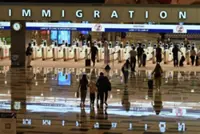SINGAPORE: Dubai-based airline Emirates is stopping its long-running flights between Singapore and Melbourne, just five years after it applied to terminate flights between Singapore and Brisbane in 2019.
In a statement on Aug 8, the Competition and Consumer Commission of Singapore (CCCS) said Emirates had requested to terminate its operations on the route.
In response to queries, the airline said in early September that it will determine the termination date after receiving the final assessment from CCCS regarding the impact of being released from its capacity commitments that were set out in an alliance with Qantas.
Emirates has been operating flights on this route since 1996 on wide-body Boeing 777s, with the exception of a three-year hiatus from 2020 during the Covid-19 pandemic.
The Dubai carrier added that it will continue to connect Singapore to Dubai with four daily flights and Melbourne to Dubai non-stop with two daily flights, in addition to offering direct flights between Melbourne and Singapore via its codeshare partner Qantas’ twice-daily flights.
Following the termination of Emirates’ Singapore-Melbourne services, the airline said it will not be flying its own planes between Singapore and Australia, although it will continue to offer codeshare flights to Melbourne, Brisbane and Sydney.
Codesharing refers to an agreement between airlines to sell seats on each other’s flights.
In March, Turkish Airlines joined a fray of five other airlines operating the crowded Singapore-Melbourne route.
The other carriers are Australian flag carrier Qantas, Singapore Airlines (SIA), Qantas’ low-cost airline Jetstar, SIA’s budget arm Scoot, and Emirates.
On this route, Emirates operates one daily flight, while Qantas operates two flights every day. SIA operates five flights daily, while Turkish Airlines, Jetstar and Scoot each operate one daily flight between Singapore and Melbourne.
Emirates will take up 11 per cent – or around 10,800 seats – of the total number of seats on the Singapore route in September, according to figures from aviation data consultancy OAG Aviation.
Set up in 2013, the alliance between Emirates and Qantas allows them to coordinate aspects of their flights such as pricing, scheduling and marketing.
CCCS had approved this partnership in 2013 only after they agreed to increase weekly seat capacity on flights from Singapore to Brisbane and Singapore to Melbourne.
In 2019, Emirates stopped its flights between Singapore and Brisbane, after CCCS lifted its capacity commitments – a pledge to provide a certain number of seats for travellers – for the route.
On why Emirates and Qantas wanted to be released from their capacity commitments for the Singapore-Melbourne route, CCCS said both airlines noted that the alliance has not harmed competitors and that the withdrawal will not create operational overlaps between both airlines.
The two airlines added that the highly competitive nature of services to and from Singapore will continue to constrain them.
CCCS held a public consultation from Aug 8 to 19 to gather feedback on the potential effects of lifting Emirates’ and Qantas’ capacity commitments for their routes between Singapore and Australia, and will publish its decision later.
SIA Group – comprising SIA and Scoot – holds the majority of 57 per cent of the seats, or 56,235 of 97,906 seats, on the Singapore-Melbourne route in September.
According to SIA Group’s latest operating figures, the load factor – or the percentage of available seats that were sold to passengers – for the South-west Pacific, which includes Melbourne and other Australian cities, dipped from 92.3 per cent in July 2023 to 90 per cent in July 2024.
Aviation analysts attributed Emirates’ withdrawal to the strong competition on the route.
Shukor Yusof, founder of aviation consultancy Endau Analytics, noted that Emirates’ recent move could be an extension of its earlier strategy to stop flights between Singapore and Brisbane, perhaps due to “changes in Emirates’ economics” for Australian routes.
Mayur Patel, head of Asia at OAG, described the Singapore-Melbourne sector as one faced with “intensive competition” from six full service and low-cost carriers, especially since Jetstar belongs to Qantas and Scoot to SIA.
He said these six airlines offer travellers a segmented approach and affordable price points. Ticket prices are unlikely to rise even with Emirates’ withdrawal of services, he added, as the market has always been segmented with price-sensitive travellers opting for budget carriers.
Emirates operates the Singapore-Melbourne route as a fifth-freedom service, where it flies from Dubai to Singapore, so it can offload and pick up passengers, before proceeding to Melbourne, or the reverse.
Patel said Emirates may be choosing to streamline its operating costs by providing non-stop flights between Dubai and Melbourne, with better scheduling options and greater connectivity between Europe and Australia.
Since only around 180 of more than 350 seats get filled at the Singapore stop on each flight, the airline could be optimising its traffic flows, said Patel.
He said Emirates may be deploying its aircraft on other profit-generating routes.
Adding that Emirates can still keep its share of the market with its codeshare arrangement with Qantas, he said this move does not signal Emirates’ exit from this sector.
On waning demand for flights to Australia, Yusof said the slight decline in SIA’s load factor for the South-west Pacific could be due to winter in the Southern Hemisphere, which may not be a major concern.
Frequent travellers on Emirates’ flights between Singapore and Melbourne are disappointed.
Lieh Lim, 54, who has been travelling between Singapore and Melbourne up to three times yearly for the past two decades, described Emirates’ termination of the service as a “sad loss” as it is the “only real competitor” to SIA.
The real estate investment adviser said Emirates easily ranks “up there” with SIA in terms of food, service, in-flight entertainment and comfort. He added that its prices are typically comparable with Qantas’ due to their alliance, which makes it cheaper than SIA.
He said will have no choice but to either fly SIA or Scoot in future, and that flight tickets for SIA could be “significantly more expensive” than those of Emirates for his family of four.
Executive education assistant Sherin Brampy, 46, said that while Emirates’ flights between Singapore and Melbourne were price-competitive and offered good in-flight service, its termination will not be a concern for her, as she can switch to other options such as Turkish Airlines and Qantas. - The Straits Times/ANN





